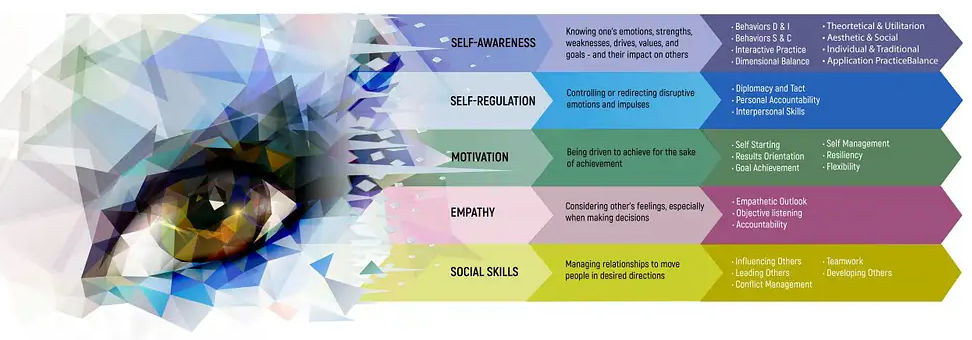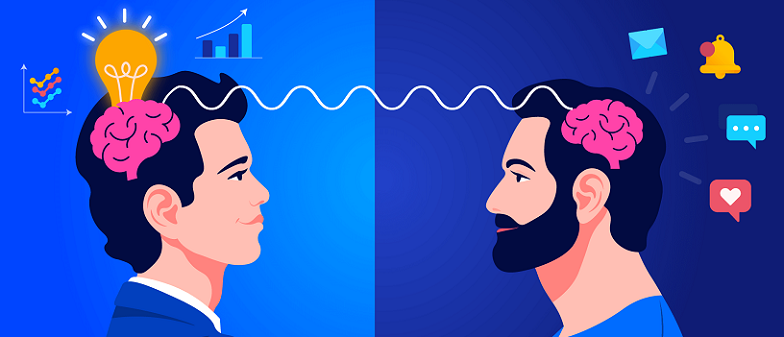
In today’s fast-paced world, it’s easy to overlook the importance of emotional intelligence in our personal lives. Yet, the ability to understand, manage, and effectively express our emotions is a vital aspect of creating and maintaining healthy relationships. Here we explore the various components of emotional intelligence, including emotional capacity, the elements of emotional intelligence, and the role of empathy and social skills.
Contents
- Introduction to Emotional Intelligence in Relationships
- Understanding Emotional Capacity
- Elements of Emotional Intelligence
- Emotional Intelligence Competencies
- Emotional Intelligence Characteristics
- The Role of Empathy in Emotional Intelligence
- Social Emotional Intelligence
- Social Skills in Emotional Intelligence
- Emotional Intelligence in Marriage
- Related Emotional Intelligence Posts
- References
Introduction to Emotional Intelligence in Relationships
Emotional intelligence (EI) is the ability to recognize, understand, and manage our emotions, as well as the emotions of others [1]. A synonym for “emotional intelligence” is “emotional quotient,” often abbreviated as EQ. Another term that conveys a similar meaning is “emotional awareness.”
Research has shown that emotional intelligence plays a significant role in the success and satisfaction of our relationships. In fact, studies suggest that emotional intelligence is more important than IQ in determining overall success in life, including both personal and professional relationships [2]. Developing emotional intelligence enables us to become better communicators, empathetic listeners, and more effective at managing conflict.
Understanding Emotional Capacity
Emotional capacity is a crucial aspect of emotional intelligence, as it refers to our ability to handle various emotional experiences effectively. In this section, we will define emotional capacity, discuss its role in relationships, and suggest ways to improve it.
Definition of Emotional Capacity
Emotional capacity is the ability to recognize, process, and respond to a wide range of emotional experiences, both in ourselves and in others [3]. It involves being in tune with our feelings, managing our emotional reactions, and maintaining emotional balance in the face of life’s challenges. A person with a high emotional capacity can navigate their emotions and those of others more effectively, fostering stronger connections and healthier relationships.
The Role of Emotional Capacity in Relationships
In the context of relationships, emotional capacity plays a vital role in fostering emotional intimacy, trust, and resilience. Partners with a strong emotional capacity can better understand and respond to each other’s emotional needs, leading to a deeper emotional bond.
Having a high emotional capacity allows individuals to navigate conflicts and difficult situations more effectively, ultimately strengthening the relationship. Emotional capacity also contributes to personal growth, as individuals learn to cope with their emotions and develop empathy for their partner’s feelings.
Ways to Improve Emotional Capacity
Improving emotional capacity is an ongoing process that involves self-reflection, practice, and patience. Here are some strategies to enhance your emotional capacity:
- Cultivate self-awareness: Regularly assess your emotions and try to identify the triggers behind them. Practicing mindfulness and journaling can help you become more in tune with your feelings.
- Manage your emotions: Learn healthy coping strategies for dealing with difficult emotions, such as deep breathing, meditation, or engaging in physical activity.
- Develop empathy: Put yourself in your partner’s shoes and try to understand their emotions and perspectives. This can help you respond more compassionately and effectively during challenging situations.
- Seek feedback: Ask for feedback from your partner and be open to their insights on how you can improve your emotional capacity.
- Practice active listening: Focus on truly hearing and understanding your partner’s feelings and concerns, rather than simply waiting for your turn to speak.

Elements of Emotional Intelligence
To master emotional intelligence, it is essential to understand its core elements. Emotional intelligence consists of five key components: self-awareness, self-regulation, motivation, empathy, and social skills [4].
Self-Awareness
Self-awareness is the foundation of emotional intelligence. It refers to the ability to recognize and understand our emotions, as well as their impact on our thoughts, behaviors, and relationships. A person with high self-awareness can identify their emotional triggers, manage their emotional reactions, and make better decisions based on their emotional state.
In the context of relationships, self-awareness allows individuals to understand their own emotional needs and communicate them effectively to their partners. This fosters emotional intimacy and reduces the likelihood of misunderstandings or conflicts.
Self-Regulation
Self-regulation, also known as emotional self-control, is the ability to manage our emotions effectively. This involves controlling impulsive behaviors, managing emotional reactions in stressful situations, and adapting to change. A person with strong self-regulation skills can remain calm under pressure and navigate challenging circumstances with greater ease.
In relationships, self-regulation is crucial for maintaining emotional balance and resolving conflicts. Partners who can regulate their emotions are more likely to have constructive conversations, even during difficult times, leading to healthier and more resilient relationships.
Motivation
Motivation, in the context of emotional intelligence, refers to the ability to persevere and stay focused on long-term goals, despite setbacks or challenges. A person with high motivation possesses a positive attitude, a strong drive for achievement, and a willingness to take initiative.
In relationships, motivation plays a key role in maintaining commitment and working together toward shared goals. Couples who are motivated to grow and improve their relationship are more likely to face challenges together and find creative solutions to problems, ultimately strengthening their bond.
Empathy
Empathy is the ability to understand and share the emotions of others. It involves being able to recognize, validate, and respond to the feelings and perspectives of those around us. A person with strong empathy skills can build deeper connections with others and foster a supportive, compassionate environment.
In the context of relationships, empathy is crucial for maintaining emotional intimacy and trust. Partners who demonstrate empathy are better equipped to understand and respond to each other’s emotional needs, which in turn leads to a stronger, more satisfying connection.
Social Skills
Social skills encompass a range of abilities that enable us to interact effectively with others. These include effective communication, conflict resolution, and relationship-building abilities. A person with strong social skills can navigate various social situations with ease and develop lasting connections with others.
In relationships, social skills play a vital role in maintaining harmony and fostering mutual understanding. Partners with strong social skills can communicate their needs, feelings, and concerns clearly, as well as actively listen to their partner’s perspective. This leads to more effective problem-solving and a healthier, more resilient relationship.

Emotional Intelligence Competencies
Emotional intelligence competencies are a set of skills and abilities that contribute to our overall emotional intelligence. These competencies can be divided into two main categories: personal competence and social competence [5].
Personal Competence
Personal competence encompasses the skills and abilities related to managing our own emotions and behaviors. It includes three main components: self-awareness, self-regulation, and motivation.
Self-Awareness
As discussed earlier, self-awareness involves recognizing and understanding our emotions and their impact on our thoughts, behaviors, and relationships. Developing self-awareness allows us to make more informed decisions, communicate our emotional needs effectively, and maintain emotional balance.
Self-Regulation
Self-regulation, or emotional self-control, is the ability to manage our emotions effectively, controlling impulsive behaviors and adapting to change. In relationships, self-regulation helps maintain emotional balance and promotes constructive conflict resolution.
Motivation
Motivation refers to the drive and persistence to achieve long-term goals, despite setbacks or challenges. In the context of relationships, motivation is essential for maintaining commitment and working together toward shared objectives.
Social Competence
Social competence involves the skills and abilities required to interact effectively with others and build strong relationships. It includes two main components: empathy and social skills.
Empathy
Empathy, as discussed earlier, is the ability to understand and share the emotions of others. In relationships, empathy fosters emotional intimacy, trust, and a supportive environment, allowing partners to better understand and respond to each other’s emotional needs.
Social Skills
Social skills encompass various abilities that enable us to interact effectively with others, including effective communication, conflict resolution, and relationship-building skills. In relationships, strong social skills promote harmony, mutual understanding, and effective problem-solving, contributing to healthier, more resilient partnerships.

Emotional Intelligence Characteristics
People with high emotional intelligence exhibit certain characteristics that enable them to effectively manage their emotions and build strong relationships.
Identifying Emotions
One of the primary characteristics of emotionally intelligent individuals is their ability to accurately identify emotions, both in themselves and in others. This involves being in tune with their own feelings, as well as recognizing the emotional cues and expressions of those around them. Developing this skill allows for better communication, increased empathy, and improved emotional awareness.
Managing Emotions
Emotionally intelligent individuals are skilled at managing their emotions, which includes controlling impulsive behaviors, staying calm under pressure, and maintaining emotional balance. By effectively managing their emotions, these individuals can navigate challenging situations and conflicts with greater ease, ultimately fostering healthier, more resilient relationships.
Understanding Emotions
Understanding emotions is another key characteristic of emotionally intelligent individuals. This involves recognizing the causes and consequences of various emotions, as well as their potential impact on thoughts, behaviors, and relationships. Gaining a deeper understanding of emotions allows individuals to make more informed decisions, respond more effectively to emotional situations, and better empathize with others.
Using Emotions to Guide Behavior
Emotionally intelligent individuals are able to use their emotions to guide their behavior, harnessing their emotional energy to make decisions, solve problems, and navigate social situations. By leveraging their emotions in this way, these individuals can enhance their personal and professional lives, as well as foster stronger connections with others.
The Role of Empathy in Emotional Intelligence
Empathy is a critical component of emotional intelligence, playing a pivotal role in the way we connect with others and navigate our relationships [6].
Importance of Empathy in Emotional Intelligence
As a core element of emotional intelligence, empathy enables us to understand and share the emotions of others. It involves recognizing, validating, and responding to the feelings and perspectives of those around us. Emotionally intelligent individuals with strong empathetic abilities can build deeper connections, foster supportive environments, and navigate interpersonal challenges more effectively.
Impact of Empathy on Relationships
In the context of relationships, empathy plays a crucial role in maintaining emotional intimacy, trust, and overall satisfaction. Partners who demonstrate empathy can better understand and respond to each other’s emotional needs, leading to stronger, more fulfilling connections. Empathy also helps to resolve conflicts in a more constructive manner, as it encourages compassionate understanding and open communication between partners.
Strategies to Enhance Empathy
Developing empathy is a continuous process that requires practice, self-reflection, and a genuine desire to understand others. Here are some strategies to improve your empathetic skills:
- Active listening: Focus on truly hearing and understanding your partner’s feelings and concerns, rather than simply waiting for your turn to speak. This involves maintaining eye contact, nodding to show understanding, and asking open-ended questions to encourage further elaboration.
- Validate emotions: Acknowledge and validate your partner’s emotions, even if you may not necessarily agree with their perspective. This helps your partner feel understood and supported, fostering emotional connection.
- Practice perspective-taking: Regularly put yourself in your partner’s shoes to better understand their emotions and experiences. This can help you develop a more compassionate and empathetic response during challenging situations.
- Engage in self-reflection: Reflect on your own emotional experiences and consider how they may influence your ability to empathize with others. This can help you identify areas for improvement and enhance your empathetic skills.

Social Emotional Intelligence
Social emotional intelligence refers to the ability to understand and manage emotions within the context of social interactions and relationships [7]. It is a critical aspect of emotional intelligence, encompassing the skills and abilities required to navigate social situations effectively and build strong connections with others.
Concept of Social Emotional Intelligence
Social emotional intelligence involves a range of skills and abilities, including empathy, effective communication, conflict resolution, and relationship-building skills. Emotionally intelligent individuals with strong social emotional intelligence can adapt to various social situations, understand and respond to the emotions of others, and foster positive, lasting relationships.
Role of Social Emotional Intelligence in Relationships
In the context of relationships, social emotional intelligence plays a crucial role in maintaining harmony, fostering mutual understanding, and enhancing overall satisfaction. Partners with strong social emotional intelligence can:
- Communicate effectively: They can express their needs, feelings, and concerns clearly and actively listen to their partner’s perspective, leading to more effective problem-solving and reduced misunderstandings.
- Resolve conflicts constructively: They can approach conflicts with empathy and understanding, facilitating open communication and working toward mutually beneficial solutions.
- Build and maintain strong connections: They can create a supportive, emotionally connected environment that fosters trust, intimacy, and resilience in their relationships.
Strategies for Improving Social Emotional Intelligence
Enhancing social emotional intelligence is an ongoing process that requires self-awareness, practice, and a commitment to personal growth. Here are some strategies to improve your social emotional intelligence:
- Develop empathy: As discussed earlier, empathy is a critical component of social emotional intelligence. Focus on actively listening, validating emotions, and practicing perspective-taking to enhance your empathetic abilities.
- Improve communication skills: Work on expressing your thoughts and feelings clearly, while also paying attention to nonverbal cues, such as body language and tone of voice. Additionally, practice active listening and ask open-ended questions to encourage deeper conversations.
- Learn conflict resolution techniques: Educate yourself on effective conflict resolution strategies, such as using “I” statements, finding common ground, and focusing on the issue at hand rather than attacking the person.
- Seek feedback: Ask for feedback from your partner and others in your social circle to gain insights into areas where you can improve your social emotional intelligence.

Social Skills in Emotional Intelligence
Social skills are a vital component of emotional intelligence, enabling individuals to interact effectively with others, build strong relationships, and navigate various social situations with ease [8].
Role of Social Skills in Emotional Intelligence
As an integral part of emotional intelligence, social skills encompass a wide range of abilities, such as effective communication, conflict resolution, and relationship-building. Emotionally intelligent individuals with strong social skills can adapt to different social environments, understand and respond to the emotions of others, and foster positive, lasting connections.
Significance of Social Skills in Relationships
In the context of relationships, social skills play a vital role in maintaining harmony, fostering mutual understanding, and enhancing overall satisfaction. Partners with strong social skills can:
- Communicate effectively: They can clearly express their needs, feelings, and concerns while actively listening to their partner’s perspective, leading to more effective problem-solving and reduced misunderstandings.
- Resolve conflicts constructively: They can approach conflicts with empathy and understanding, facilitating open communication and working toward mutually beneficial solutions.
- Build and maintain strong connections: They can create a supportive, emotionally connected environment that fosters trust, intimacy, and resilience in their relationships.
Strategies for Enhancing Social Skills
Improving social skills requires practice, self-awareness, and a commitment to personal growth. Here are some strategies to enhance your social skills:
- Practice active listening: Focus on truly hearing and understanding the other person’s perspective, rather than simply waiting for your turn to speak. This involves maintaining eye contact, nodding to show understanding, and asking open-ended questions to encourage further elaboration.
- Develop effective communication techniques: Work on expressing your thoughts and feelings clearly and concisely, while also paying attention to nonverbal cues, such as body language and tone of voice.
- Learn conflict resolution strategies: Educate yourself on effective conflict resolution techniques, such as using “I” statements, finding common ground, and focusing on the issue at hand rather than attacking the person.
- Build rapport: Cultivate your ability to connect with others by showing genuine interest, finding common ground, and being open and approachable.
Emotional Intelligence in Marriage
Emotional intelligence plays a crucial role in the success and longevity of a marriage, as it influences the way partners communicate, resolve conflicts, and support each other emotionally [9].
Significance of Emotional Intelligence in Marriage
In a marriage, emotional intelligence contributes to the overall health and satisfaction of the relationship. Partners with high emotional intelligence can better understand and respond to each other’s emotional needs, fostering trust, intimacy, and resilience. Additionally, emotionally intelligent couples can navigate conflicts more effectively, leading to more harmonious and fulfilling partnerships.
Benefits of Emotional Intelligence in Marriage
Cultivating emotional intelligence within a marriage offers numerous benefits, including:
- Improved communication: Emotionally intelligent couples can express their feelings and concerns clearly and actively listen to each other, leading to fewer misunderstandings and more effective problem-solving.
- Constructive conflict resolution: Emotionally intelligent partners can approach conflicts with empathy and understanding, working together to find mutually beneficial solutions while maintaining emotional balance.
- Increased emotional intimacy: Emotional intelligence fosters a deeper understanding and connection between partners, allowing for increased emotional intimacy and support.
- Greater resilience: Emotionally intelligent couples can navigate challenges and setbacks more effectively, fostering resilience and enhancing the overall satisfaction and longevity of their marriage.
Strategies to Enhance Emotional Intelligence in Marriage
Improving emotional intelligence as a couple requires commitment, communication, and self-awareness. Here are some strategies to enhance emotional intelligence within your marriage:
- Practice active listening: When communicating with your spouse, focus on truly understanding their perspective, rather than simply waiting for your turn to speak. This involves maintaining eye contact, nodding to show understanding, and asking open-ended questions to encourage further elaboration.
- Develop empathy: Work on understanding and validating your partner’s emotions and experiences, even if you may not necessarily agree with their perspective. This can help foster emotional connection and support within your marriage.
- Engage in self-reflection: Reflect on your own emotional experiences and consider how they may influence your ability to empathize with and support your spouse. This can help you identify areas for improvement and enhance your emotional intelligence as a couple.
Seek professional guidance: If needed, consider seeking guidance from a therapist or counselor specializing in couples’ therapy to help you and your spouse navigate challenges and enhance your emotional intelligence together.
Related Emotional Intelligence Posts
Mastering Emotional Intelligence: Worksheets, Exercises, and Activities for a Happier, More Connected Life
The Role of Emotional Intelligence in Slowing Cognitive Decline
Emotional Intelligence: A Guide to Coaching, Teacher Development, and Engaging Workshops
References
[1] Emotional Intelligence as a Predictor of Academic and/or Professional Success
[2] Why emotional intelligence makes you more successful
[3] Building Adult Social and Emotional Capacity
[4] 5 Qualities of Emotional Intelligence
[5] Personal & Social Competency
[6] Emotional intelligence, empathy and alexithymia
[7] Emotional Intelligence and Social-Emotional Learning
[8] Emotional Intelligence and Social Skills
[9] Making Love Last: The Importance of Emotional Intelligence

